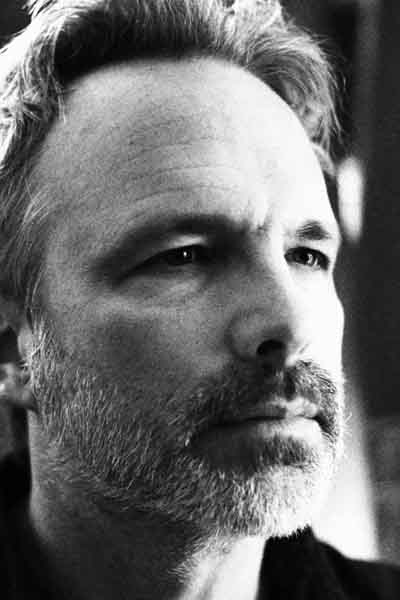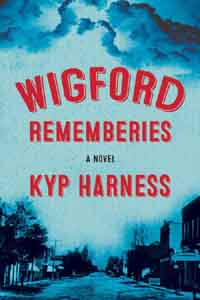 Versatility in his writing allows Toronto-based musician and author Kyp Harness to pull off the impressive feat of being a swaggering punk at one moment, and a poignant folk balladeer the next. A natural storyteller, his lyrics are rich in detail, emotional, and filled with poetic metaphors. His delivery is always slightly off-center but always deeply personal.
Versatility in his writing allows Toronto-based musician and author Kyp Harness to pull off the impressive feat of being a swaggering punk at one moment, and a poignant folk balladeer the next. A natural storyteller, his lyrics are rich in detail, emotional, and filled with poetic metaphors. His delivery is always slightly off-center but always deeply personal.
Harness’s debut novel, Wigford Rememberies, was recently published by Nightwood Editions. The novel, which takes place in a fictional small town in Ontario, has been described by horror writer Tony Burgess as having “a unique flow: word and action, thought and thing are all contiguous and combined in lovely braided sentences.”
Related Posts
Additionally, Kyp’s latest album, Stoplight Moon was just released independently. In this interview, Kyp discusses his music, his new novel and the differences in between. Ron Sexsmith called him “one of the finest songwriters on the planet” and the Calgary Straight said of his work, “I won’t mince words: Right now, Kyp Harness is the most vital, essential Canadian singer-songwriter out there.”
When did you start working on Wigford Rememberies?
Some time ago I started making these stories, and as they came they all seemed to fit together, like there was a web connecting them all together that I couldn’t define or see, and somehow it made a much bigger story. The novel came together and accrued, more than being written, and its form and order asserted itself over years.
Coming from a musical background, how has your experience thus far as a writer been in comparison?
I always have written, and in my mind I thought that the stories and poems in my songs would get heard more than if they were just on the printed page. I don’t know how true that is now, but I’ve been sending my writing out now for many years, and the difference is that just straight out writing is a more solitary experience, since you can always take a completed song and play it immediately tonight for people at an open stage. Writing is more like yelling out to the sky and sometimes waiting for years for an echo to return. Other than that, the rhythm and the beat are the same both in songs and on the page — it’s all writing and it’s all music!
When did you realize the stories you were writing would become a larger work? Were there any stories that you wrote during this time that interfered with the quest to finish Wigford Rememberies?
In some way I always knew the pieces already were part of a larger work, but for awhile I didn’t see how, I just kept writing and uncovering the different tales and scenes, and then I saw the whole pattern…the stories were different facets of a stone. I’ve written other things — mostly songs — as I wrote the book, and even some writings that are entirely different from Wigford, and they didn’t interfere with the novel, because it was like a river always running with its own rhythm underneath.
You’ve also released a new album this year called Stoplight Moon which has been garnering fantastic reviews. Do you think you’ll combine your book tour with a music tour or is it important for you to keep those separate?
I don’t need to keep them separate. Some say some of my songs are almost like novels…they’re both a form of storytelling, and I’d gladly do a night of reading and a few songs too. My writing affects me in the same kind of emotional way as my music does.
You also write a web comic called Mortimer the Slug. Can you talk a bit about him?
From my earliest memories, I drew, and through school would circulate my drawings around on the backs of exercise pages, and at one point I even started my own newspaper, which was stopped by the school principal because kids were reading it in class. Through most of my school years I had the understanding I would be a cartoonist when I grew up. Then other creative endeavors grabbed hold me. Around seven years ago I got inspired to make a comic strip that would have continuing story lines like the old newspaper strips. I drew them for about three or four years everyday. I sent them to newspapers but they weren’t interested so I made them a web comic. My wife the poet Allison Grayhurst posts them on Facebook. Mortimer the Slug is a lazy, angry, depressed slug who doesn’t like anybody.
In an interview with Slow City, you state that music is your life whether you want it to be or not. Do you feel that Wigford Rememberies as an creative project took hold of you and had a similar impact on you the way music has making it impossible to detach from?
The book seems elemental and integral to me just as much as any of my songs…it lives really close to me. A certain drive overtakes me to do these things, and they’re essential to me. I like to keep pushing at things to see what’ll happen.
 What are your next creative projects? More writing? Music?
What are your next creative projects? More writing? Music?
I do like to keep writing — I have a comic novel, and a bigger 600-page thing, a few other works, some scripts. And it seems I will always have songs that I want to put out in some form.
Who did you read growing up and did those books stay with you or change over time?
Aside from Golden Books and Big Little Books, writing really spoke to me in James Joyce’s books for the first time, then I liked Henry Miller and from there to Dostoevsky. I liked Kerouac and the beats after that. The works of William Blake comprise a big part of my own personal bible. To the Lighthouse by Virginia Woolf made a big impression on me. Camus, Faulkner. All these books stay with me in my core and they don’t change. There’s something really elemental about them and they all mean a lot to me.
Wigford is a fictional small town in Ontario. What can you tell us about the town’s inspiration?
They say you can only write what you know, so the community in my mind is similar to those I knew growing up, and a type of folk I don’t see written about that much. I think there are many places like it, which mean a lot to the people within them but don’t mean anything to people from anywhere else. It’s a piece of the universe that in exploring you can hopefully get to know the universe as a whole a bit better.
Your writing is lilting and reminds me of Tom Waits sharing the stage with Kurt Vonnegut. In the opening description of David Crowe, for example, the writing seems humorous, hyperbolic, and cruel and, so far as the narrator is concerned, accurate. Did you attempt to hit a lot of marks with the narrator’s voice? He seems omniscient, judgemental yet objective at times. It’s refreshing. How did you find this voice?
Getting the note and the tone and the key right is a big deal and for me it can only be felt. The thing marking off writing from other pursuits is that you can be in a person’s heart, and observing them through a window, and sitting across from them at a table, all at the same time. I think my voice is like I’m a character in the novel too, or at least on the same level as the other characters — which I am. I try to grapple with the sharp edges of life so I guess you could say I approach it with a combination of mercilessness and empathy.